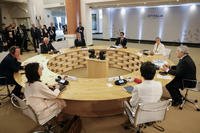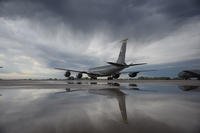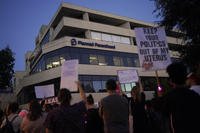Iraqi counterterrorism forces entered Fallujah on Wednesday as the U.S. military expressed concern about the safety of civilians fleeing the siege of the city about 40 miles west of Baghdad.
"There is great concern about the state of civilians inside Fallujah" and those who have managed to escape only to be treated as possible sympathizers of the Islamic State in Iraq and Syria, or ISIS, said Army Col. Chris Garver, the new spokesman for Combined Joint Task Force-Operation Inherent Resolve in Baghdad.
Garver said the U.S. military was aware of reports by the United Nations and humanitarian groups that civilians from mostly-Sunni Fallujah were being abused and in some cases executed by the Shia Popular Mobilization Units that joined with the Iraqi Security Forces in the campaign to retake Fallujah.
However, Garver said it was up to the government of Prime Minister Haider al-Abadi to deal with the allegations of Law of Armed Conflict violations. The best way to ease the plight of Fallujah civilians was to inflict a quick and decisive on the ISIS militants defending the city, Garver said.
"It's really an issue between the Iraqis and the humanitarian organizations providing support" for the fleeing Fallujah civilians who were being housed in makeshift tent camps where food and water reportedly was running short, Garver said in his first briefing to the Pentagon since replacing Army Col. Steve Warren as the task force's main spokesman.
The already overcrowded tent camps have been stretched thin by the arrival in the last 10 days of an additional 10,000 civilians fleeing Fallujah, according to the UN and the International Organization for Migration.
In addition to the advance into Fallujah, Garver said that the U.S.-backed mixed force of Kurds, Arabs and Christians under the umbrella of the Syrian Democratic Forces was making progress in the effort to retake the northeastern Syrian city of Manbij, one of the last remaining ISIS infiltration routes for foreign fighters.
"I can say that the matter of liberating Manbij is settled," Sharfan Darwish, a member of the Manbij Military Council supporting the Syrian Democratic Forces, told Reuters. "When the time comes, we will enter it, of course."
Garver said that more than 3,000 Syrian Democratic Forces were advancing on Manbij on multiple fronts but were being "met by heavy resistance from Daesh," an Arabic acronym for ISIS. He said at least 12 of the fighters had been killed and more than 100 wounded in the advance on Manbij that has been supported by more than 100 U.S. airstrikes.
In another sign of the complexity of Syria's five-year-old civil war, Turkey again raised concerns about the presence of fighters from the Kurdish YPG (Popular Protection Units) with the Syrian Democratic Forces.
The YPG is the military wing of the Syrian-Kurdish Democratic Union Party, which Turkey claims is a front for the PKK (Kurdistan Workers Party). Both Turkey and the U.S. have labeled the PKK a terrorist organization.
Turkey warned the YPG against crossing west of the Euphrates, but Garver, in praising the growing capabilities of the Syrian Democratic Forces, noted that the forces had thrown up a makeshift bridge over the river to speed the advance on Manbij.
Garver acknowledged the presence of YPG fighters with the Syrian Democratic Forces in the Manbij operation but said they were only in a supporting role.
Last month, Turkey protested to the U.S. when American Special Forces advisers moving with the YPG near the front lines in Syria were photographed wearing the arm patches of the YPG. Army Lt. Gen. Sean MacFarland, commander of the Combined Joint Task Force, immediately banned the wearing of YPG insignia by U.S. troops.
In Fallujah, "fighting in the approaches to the city has been significant, especially in the south," Garver said. ISIS fighters were in what Garver described as "complex defensive positions" with coordinated fields of fire, and were using minefields and an extensive tunnel system under the city to hold off the Iraqi advance.
"We don't know if their intent is to fight to the last man or abandon" the city, Garver said. The U.S. had no solid estimates on the number of ISIS fighters in Fallujah or the number of civilians, though Iraqi officials believe there are about 50,000 still in Fallujah, once a city of about 300,000 residents, he said.
Garver said the U.S. has conducted 67 airstrikes in and around Fallujah in the last three weeks in support of the campaign to retake the city, including seven in the last 48 hours. He acknowledged concerns about the slowness of the Fallujah operation but "this is going to happen at the Iraqi pace." He also noted, "It's hot here in June, as you know, and that all makes it harder to fight."
On Wednesday morning, the Iraqi counterterrorism forces, which have spearheaded Iraqi security forces successes in Ramadi, Hit, Tikrit and other cities, moved from the southern edges of Fallujah into the Shuhada neighborhood of the city, about a mile from the city center, Maj Gen Hadi Zayid Kassar, deputy commander of the counter-terrorism forces in Fallujah, told The Associated Press.
"We expect to face more resistance, especially because we are the only forces entering the city," said Gen. Haider Fadel, another counter-terrorism leader. Prime Minister Abadi has told the U.S. that the Shia Popular Mobilization Units backed by Iran will be kept out of the mostly-Sunni city to avoid the potential for a bloodbath.
While expressing concern for the civilians, Garver said it was necessary for the Iraqi forces to screen those fleeing the city for possible ISIS sympathizers or fighters who might be among them.
"You would completely expect the Iraqi government to take those procedures to screen them," Garver said. "If there are fighters there, they're weeding them out and sending them to detention. It's completely understandable."
As a distraction from its recent string battlefield losses, ISIS could be expected to take advantage of the Muslim holy month of Ramadan to carry out more suicide bombing attacks in Baghdad, Garver said.
"We expect Daesh to do more terrorist attacks to distract from the fact that they keep losing territory," he said.
--Richard Sisk can be reached at Richard.Sisk@Military.com.






























